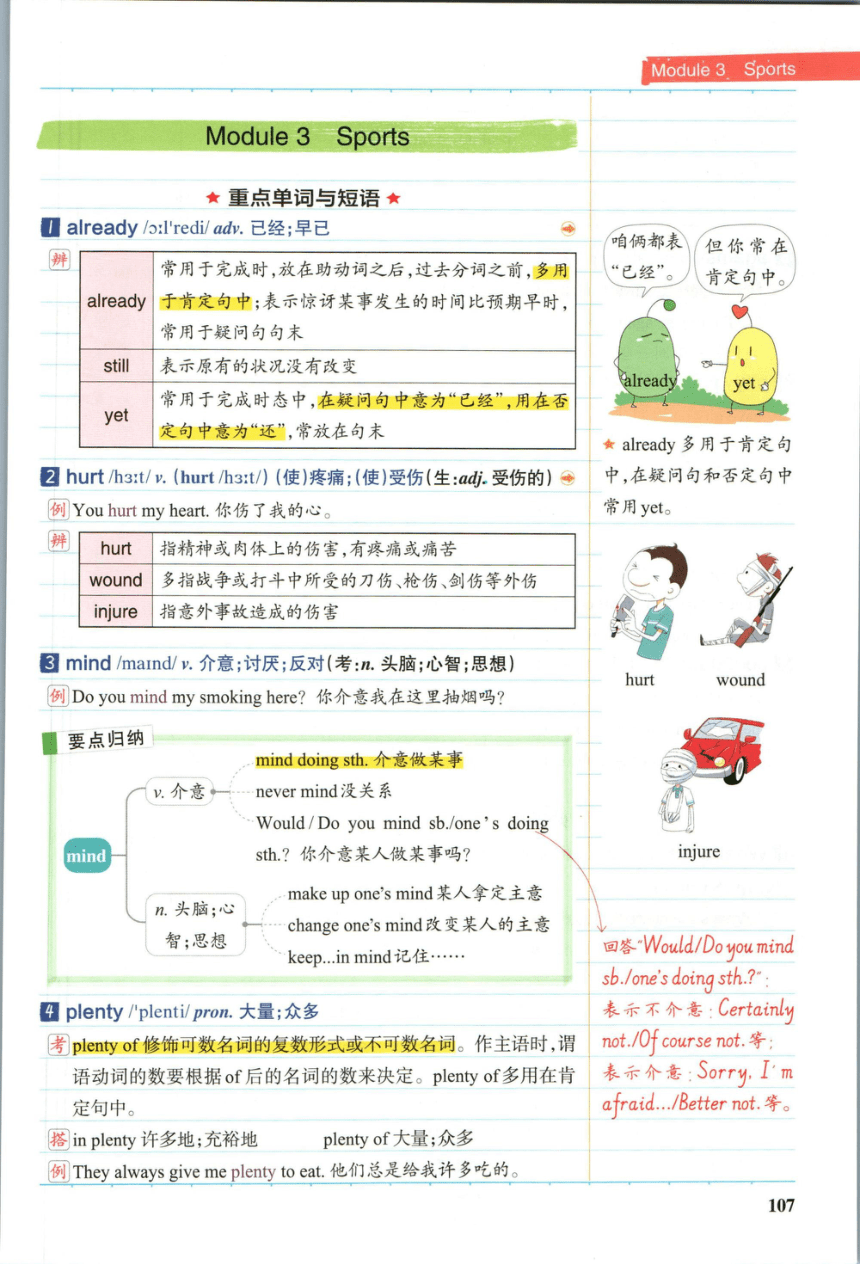【学霸秘籍】八(上) Module 3 Sports-外研版英语-尖子生创优课堂笔记(pdf版)
文档属性
| 名称 | 【学霸秘籍】八(上) Module 3 Sports-外研版英语-尖子生创优课堂笔记(pdf版) |  | |
| 格式 | |||
| 文件大小 | 4.7MB | ||
| 资源类型 | 试卷 | ||
| 版本资源 | 外研版 | ||
| 科目 | 英语 | ||
| 更新时间 | 2024-02-29 15:00:04 | ||
图片预览

文档简介
Module 3 Sports
Module 3 Sports
★重点单词与短语★
already /:'Iredi/ad.已经;早已
咱俩都表
但你常在
辨
常用于完成时,放在助动词之后,过去分词之前,多用
“已经”。
肯定句中。
already
于肯定句中;表示惊讶某事发生的时间比预期早时,
常用于疑问句句末
still
表示原有的状况没有改变
50
already
yet
常用于完成时态中,在疑问句中意为“已经”,用在否
yet
定句中意为“还”,常放在句末
★already多用于肯定句
2 hurt /h3t/.(hurt /h3t/)(使)疼痛;(使)受伤(生:ad.受伤的)⊙
中,在疑问句和否定句中
例You hurt my heart.你伤了我的心。
常用yet。
辨
hurt
指精神或肉体上的伤害,有疼痛或痛苦
wound
多指战争或打斗中所受的刀伤、枪伤、剑伤等外伤
injure
指意外事故造成的伤害
3 mind /maind/v.介意;讨厌;反对(考:n.头脑;心智;思想)
hurt
wound
例Do you mind my smoking here 你介意我在这里抽烟吗?
要点归纳
mind doing sth.介意做某事
y.介意一
never mind没关系
Would/Do you mind sb./one's doing
mind
sth. 你介意某人做某事吗?
injure
make up one's mind某人拿定主意
n.头脑;心
change one's mind改变某人的主意
智;思想
keep..in mind记住.
回答Would/Do you mind
sb./one's doing sth.
4 plenty'plenti/pron..大量;众多
表示不介意:Certainly
考plenty of修饰可数名词的复数形式或不可数名词。作主语时,谓
not./0 f course not.等:
语动词的数要根据of后的名词的数来决定。plenty of多用在肯
表示介意:Sorry,Im
定句中。
afraid./Better not.等。
搭in plenty许多地;充裕地
plenty of大量;众多
例They always give me plenty to eat.他们总是给我许多吃的。
107
八年级上册
5 beat/bi:t/.(beat/bi:t/)打败;战胜(生:y.心脏跳动‖n.节拍)
搭beat off击退(敌人等)
beat down砸开;砸破
辨
beat
意为“打败;战胜”,用于比赛时,其宾语为所战胜的对手
win
意为“赢;获胜”,其宾语为比赛的项目、奖品或战争等
6 against/'genst/prep.(在比赛或战斗中)对(某人或某事物)
逆着
碰,撞
考注意不要把against误用作动词,它是介词,不能独立作谓语。
against
We'll compete against the best companies in Europe.
NO WAR
我们将和欧洲一些一流的公司竞争。
乙pity /'pti/.可惜;遗憾
搭have pity on怜悯,同情
倚着
反对
out of pity出于怜悯,出于同情
What a pity!真可惜!
It's a pity that.……真可惜。
例It's a pity that he didn't accept the job.他没有接受那份工作真可惜。
8 chance /t∫a:ns/n.可能性;机会
搭by chance偶然
take a chance冒险
by any chance也许;可能
have a chance有机会
have a chance to do/of doing..有机会做…
例There is a good chance to go back to London..有一个回伦敦的好机会。
词形转换
9 confident/'kDnfidant/ad.自信的(考:ad.有把握的)
confidence n.信心
搭be confident of..对…有把握
be confident+-that从句确信…
confident adj.自信的
例He is confident of getting first place.他对拿第一有把握。
confidently ad.自信地
★必背句型女
What's the matter with you,Tony 托尼,你怎么了?(教材
What's the matter with
you 你怎么了?
八上p.18Unit1)
考“What's the matter ”意为“怎么了?”,常与介词with连用,用来询
问某人或某物出什么事/毛病了。matter是名词,意为“问题;麻
烦”,前面要加the。
2 We all arrive as early as we can so that we have time
I have a sore throat.
to warm up.我们都尽可能早到,以便我们有时间热身。(教材八上
我嗓子疼。
p.20 Unit 2)
★询问某人或某事的情
考so that意为“以便;为了”,引导目的状语从句。此时,so that可与
况还可以用:“What's
in order that.互换。但so that引导的从句只能放在主句之后,而in
wrong?”“What'sthe
order that引导的从句既可放在主句前也可放在主句后。
trouble ”“What'sup ”。
108
Module 3 Sports
★重点单词与短语★
already /:'Iredi/ad.已经;早已
咱俩都表
但你常在
辨
常用于完成时,放在助动词之后,过去分词之前,多用
“已经”。
肯定句中。
already
于肯定句中;表示惊讶某事发生的时间比预期早时,
常用于疑问句句末
still
表示原有的状况没有改变
50
already
yet
常用于完成时态中,在疑问句中意为“已经”,用在否
yet
定句中意为“还”,常放在句末
★already多用于肯定句
2 hurt /h3t/.(hurt /h3t/)(使)疼痛;(使)受伤(生:ad.受伤的)⊙
中,在疑问句和否定句中
例You hurt my heart.你伤了我的心。
常用yet。
辨
hurt
指精神或肉体上的伤害,有疼痛或痛苦
wound
多指战争或打斗中所受的刀伤、枪伤、剑伤等外伤
injure
指意外事故造成的伤害
3 mind /maind/v.介意;讨厌;反对(考:n.头脑;心智;思想)
hurt
wound
例Do you mind my smoking here 你介意我在这里抽烟吗?
要点归纳
mind doing sth.介意做某事
y.介意一
never mind没关系
Would/Do you mind sb./one's doing
mind
sth. 你介意某人做某事吗?
injure
make up one's mind某人拿定主意
n.头脑;心
change one's mind改变某人的主意
智;思想
keep..in mind记住.
回答Would/Do you mind
sb./one's doing sth.
4 plenty'plenti/pron..大量;众多
表示不介意:Certainly
考plenty of修饰可数名词的复数形式或不可数名词。作主语时,谓
not./0 f course not.等:
语动词的数要根据of后的名词的数来决定。plenty of多用在肯
表示介意:Sorry,Im
定句中。
afraid./Better not.等。
搭in plenty许多地;充裕地
plenty of大量;众多
例They always give me plenty to eat.他们总是给我许多吃的。
107
八年级上册
5 beat/bi:t/.(beat/bi:t/)打败;战胜(生:y.心脏跳动‖n.节拍)
搭beat off击退(敌人等)
beat down砸开;砸破
辨
beat
意为“打败;战胜”,用于比赛时,其宾语为所战胜的对手
win
意为“赢;获胜”,其宾语为比赛的项目、奖品或战争等
6 against/'genst/prep.(在比赛或战斗中)对(某人或某事物)
逆着
碰,撞
考注意不要把against误用作动词,它是介词,不能独立作谓语。
against
We'll compete against the best companies in Europe.
NO WAR
我们将和欧洲一些一流的公司竞争。
乙pity /'pti/.可惜;遗憾
搭have pity on怜悯,同情
倚着
反对
out of pity出于怜悯,出于同情
What a pity!真可惜!
It's a pity that.……真可惜。
例It's a pity that he didn't accept the job.他没有接受那份工作真可惜。
8 chance /t∫a:ns/n.可能性;机会
搭by chance偶然
take a chance冒险
by any chance也许;可能
have a chance有机会
have a chance to do/of doing..有机会做…
例There is a good chance to go back to London..有一个回伦敦的好机会。
词形转换
9 confident/'kDnfidant/ad.自信的(考:ad.有把握的)
confidence n.信心
搭be confident of..对…有把握
be confident+-that从句确信…
confident adj.自信的
例He is confident of getting first place.他对拿第一有把握。
confidently ad.自信地
★必背句型女
What's the matter with you,Tony 托尼,你怎么了?(教材
What's the matter with
you 你怎么了?
八上p.18Unit1)
考“What's the matter ”意为“怎么了?”,常与介词with连用,用来询
问某人或某物出什么事/毛病了。matter是名词,意为“问题;麻
烦”,前面要加the。
2 We all arrive as early as we can so that we have time
I have a sore throat.
to warm up.我们都尽可能早到,以便我们有时间热身。(教材八上
我嗓子疼。
p.20 Unit 2)
★询问某人或某事的情
考so that意为“以便;为了”,引导目的状语从句。此时,so that可与
况还可以用:“What's
in order that.互换。但so that引导的从句只能放在主句之后,而in
wrong?”“What'sthe
order that引导的从句既可放在主句前也可放在主句后。
trouble ”“What'sup ”。
108
